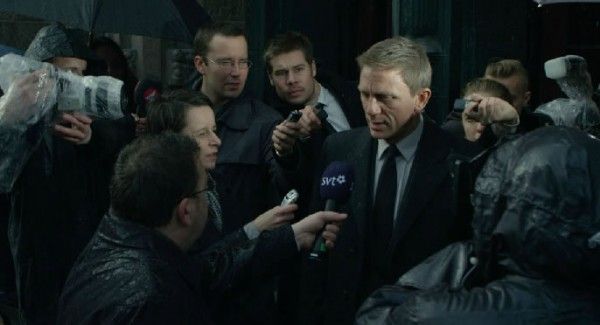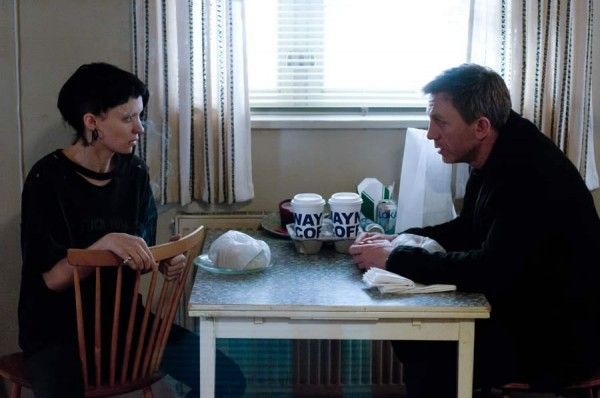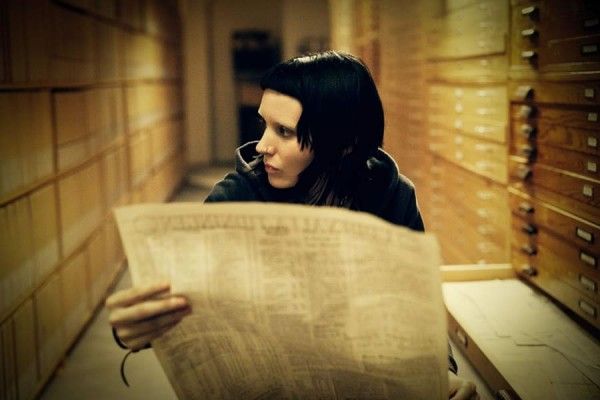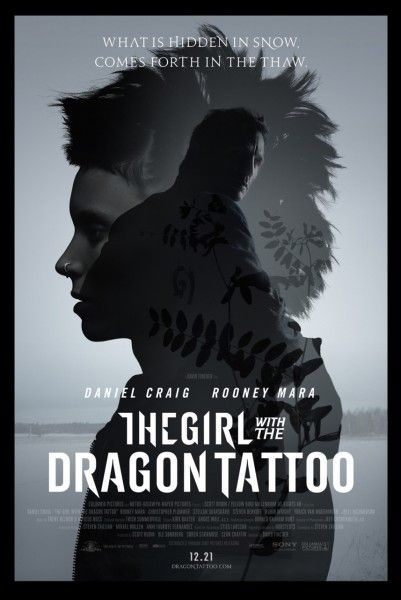Director David Fincher has reached the point where he can work his magic on almost any movie. There's nothing journeyman about his approach and he hasn't shied away from taking complex narratives and turning them into powerful cinema. But what can he do with a simplistic, poorly-structured narrative? The Girl with the Dragon Tattoo is too sprawling to be a tight little thriller like Panic Room, lacks the complexity of Zodiac, and has a weaker hook than Se7en. But it's an international best-seller and readers have warmed to a lukewarm detective story embellished with a unique female protagonist. There's enough energy in the score and the performances to support the inconsistent technical aspects, but The Girl with the Dragon Tattoo currently stands as Fincher's weakest crime-thriller to date.
Swedish journalist Mikael Blomkvist's (Daniel Craig) reputation is in ruins and he's deeply in debt after losing a libel case against the head of a powerful pharmaceutical company. Soon afterwards, Mikael gets a call from Henrik Vanger (Christopher Plummer), the dying head of the wealthy Vagner empire. Henrik has been vexed by the disappearance of his beloved niece, Harriet, 40 years ago. He offers to pay Mikael a considerable sum if he'll look at the case with a fresh set of eyes and hoperfully discover her killer. As Mikael begins to examine the case, we cut back to Stockholm and learn about enigmatic, dangerous, and brilliant hacker Lisbeth Salander (Rooney Mara). Lisbeth was hired by a consulting firm to do a background check on Mikael, but she's also a ward of the state. When her legal guardian suffers a stroke, she is placed under the supervision of the sadistic Nils Bjurman (Yorick van Wageningen).
Lisbeth and Mikael spend the first act totally apart with their only relationship being her research into his private life as part of the Vagner's background check. While Mikael familiarizes himself with the Vagner case and the band of despicable players who make up the Vagner family, Lisbeth's story with Nils is only relevant thematically, and doesn't relate to Mikael's investigation. When the second act begins and Mikael enlists her as a researcher in the Vagner case, his investigation feels small compared to the intensity of Lisbeth's recent trauma. For the rest of the movie, Lisbeth serves three purposes: supporting the subtext, adding spice to Mikael's storyline, and helping the audience indulge in a revenge fantasy.
Violence and rape towards women is the worthwhile subtext The Girl with the Dragon Tattoo. The book's late author, Stieg Larsson, wanted a woman to get revenge on her attacker, and so he created a Lisbeth, a smart but violent avenger who deals with her rapist with utmost brutality. We cheer for Lisbeth during her revenge (Fincher even designs her eye-shadow to look like a black mask), but then that story is over and she's bringing her unique personality to help Mikael "catch a killer of women." The revenge fantasy stops Dragon Tattoo from dealing with rape in a realistic fashion, and so any psychological trauma is left by the wayside in favor of Lisbeth joining Mikael's investigation. One could argue that her assistance is her way of dealing with the trauma, but it's an investigation she would most likely take on even if she had never been attacked, and so her rape in the first act is nothing more than feels exploitative. The slow and poorly-plotted first act is the major failing of Dragon Tattoo's story, but there's no way around it without providing a major change to the book. Unfortunately, film adaptation of international best-sellers can only be handled with a scalpel even when a chainsaw would be the more appropriate tool.
Both Fincher's adaptation and the 2009 Swedish adaptation attempt to salvage the first act by letting the audience become enraptured with Lisbeth, and they've both succeeded by casting a strong female actress in the role. The search for the new Lisbeth took months and eventually Fincher settled on Mara, who had a brief but memorable role in The Social Network. Mara underwent a full physical transformation for the role, but it's her commanding presence that makes the character work. She lets just enough vulnerability slip through to let us know that Lisbeth is a real person, but her main task is selling Lisbeth's borderline-psychopathic tendencies. She succeeds admirably and you would instantly understand her personality even if she didn't wear a t-shirt bearing the words "Fuck You You Fucking Fuck."
The t-shirt (which doesn't appear until later in the film) isn't an attempt to cover for Mara, but one of the blessed moments of comic relief. Fincher and screenwriter Steve Zaillian understand the bleakness of the story and wisely threw in more dark comedy than the Swedish version. There are other smart nips and tucks along the way that give the story the investigative intensity of Zodiac rather than sending Lisbeth and Mikael on an unnecessary road trip across Sweden. Zaillian and Fincher understand that in the modern age, most research can be done online or in a library and that field trips would only slow down the investigation.
While Dragon Tattoo has Fincher's trademark control, it lacks his thoughtful consistency. There are moments where the cinematography comes alive through interesting shot choices and perspectives that push the film beyond its bland story. But those moments are outweighed by dull, static conversations where the only the grey-and-white color palette provide any personality. The same goes for the editing, which manages to draw the viewer into the investigation, but rarely ratchets up the tension (although it should be noted that since I knew how the story ended, this aspect would have probably been lost on me no matter what).
The only consistently terrific aspects are the performances and the score. As I previously noted, the long casting search for Mara paid off in spades, but Craig is equally strong despite his less-flashy character. Craig wisely plays Mikael as subdued, slightly-meek man. Mikael is intelligent (although he doesn't hold a candle to Lisbeth), but he's reserved and unprepared for the dangers of the investigation. It's a thoughtful performance from an actor who usually plays tough, masculine roles, and here Craig gives over that personality to Mara. The relationship between Mikael and Lisbeth is the heartbeat of the film and further highlights the weakness of the first act that keeps them apart.
Trent Reznor and Atticus Ross once again provide Fincher with an unforgettable score. While their new score is still in the same ambient-electronic genre of The Social Network, the difference is night-and-day, especially since daylight almost never breaks in the world of The Girl with the Dragon Tattoo. It's bleak, ominous, and haunting, but rarely depressing. Reznor and Ross know when to throw in an angry heartbeat and a melancholy sigh and their work here manages to carry the film through its weaker moments.
Unlike Bill Condon's direction of The Twilight Saga: Breaking Dawn – Part 1, Fincher doesn't feel like he's fighting the story of The Girl with the Dragon Tattoo. Granted, Dragon Tattoo's plot and characters are infinitely better than Breaking Dawn's, but Fincher feels like he's trying to work with his story rather than overcome it. However, there always seems to be some confusion on how to best deal with the weaker aspects of the plot, and how to balance the subtle and unnerving with the forceful and disarming. But not even Fincher's immense talent can completely offset the story's weak structure, its simplistic subtext, and the bland narrative.
Rating: C+





